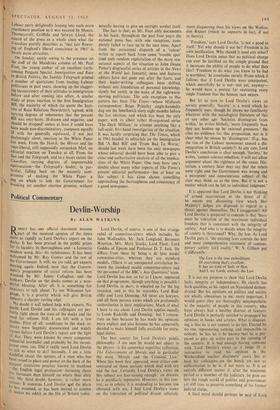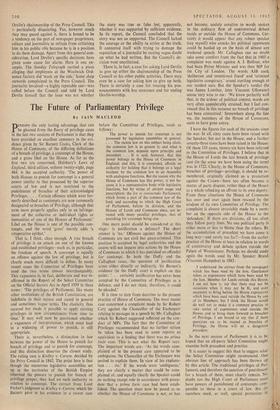Political Commentary
Devlin-Worship
By ALAN WATKINS RARELY has any official document become part of the received opinion of the times quite as rapidly as Lord Devlin's report on the docks. It has been praised in the public prints for its lucidity, its thoroughness and—a favourite modern word, this—its ruthlessness. It has been Welcomed by Mr. Ray Gunter and the rest of the Government. It will, we are told, get exports moving again. Indeed, now that the Govern- ment's programme of social reform has been wrecked by Mr. James Callaghan and the bankers, Devlin on the docks conies as a won- ..4) derful blessing. After all, it is something for Ministers to talk about. To use Wilsonian Ian- 'Page, it is a priority which will give British industry a sharper cutting edge. No doubt it will indeed help with exports. No doubt Lord Devlin and his colleagues are per- fectly right about the state of the docks and the need for reform. Still, I am left with a few doubts. First of all, conditions in the dock in- dustry were lengthily documented and widely l'nown before Lord Devlin's report saw the light of day. They were known by every competent industrial journalist and probably by the incom- petent ones, too. Did it really need Lord Devlin to tell us what to do? Secondly, I am a little doubtful about the aptness of a man who has been raised to place and power on the back of the greatest restrictive practice known to mankind --the English legal profession—lecturing those less fortunate than himself on where their duty lies. My third doubt, however, is rather more serious. It concerns Lord Devlin and the place he has assumed, or has been invited to assume tit makes no odds), in the life of Britain today. Lord Devlin, of course, is one of that strange cabal of committee-sitters which includes Sir John Wolfenden, Mr. Jack Longland, Baroness Wootton, Mrs. Mary Stocks, Lord Fleck, Lord Geddes of Epsom and Professor D. T. Jack. He differs from these by being a de luxe model committee-sitter, whereas they are standard models. (There is an unexpected correlation be- tween the standard model committee-sitters and the personnel of the BBC's Any Questions? team. Lord Devlin has not, so far as I know, appeared on that programme, though anything is possible.) Lord Devlin, in short, is wheeled up for the big occasion, and in this he resembles Lord Rad- cliffe and Lord Denning. All three are lawyers, and all three possess views which are profoundly authoritarian in their implications. Much of what I have to say about Lord Devlin applies equally to Lords Radcliffe and Denning: but I concen- trate on him because he has made his opinions more explicit and also because he has apparently decided to make himself fully available for extra- legal duties.
The best source for Lord Devlin's public philosophy---I am sure he would not object to the phrase---is his somewhat repetitive collection, The Enforcement of Morals and in particular the essay 'Morals and the Criminal Law.' When this book first appeared, most critics con- centrated on those sections which deal with sex and the law. Certainly Lord Devlin's views on this subject are hair-raising enough: on divorce he is peculiarly repressive. However, in this con- text, as in others, it is misleading to become too obsessed with sex. I find Lord Devlin's views on the toleration of political dissent infinitely more disquieting than his views on the Wolfen- den Report (which he supports in fact, if not in theory).
'Freedom,' says Lord Devlin, 'is not a good in itself.' Yet why should it not be? Freedom is its own justification. Why should it need any other? Does Lord Devlin mean that no political change can ever be justified on the simple ground that it increases the ability of people to do what they like? 'Freedom to do what you know to be bad is worthless,' he concludes sternly. From which it follows that if Lord Devlin were omnipotent, which mercifully he is not—not yet, anyway— he would have a pretext for restricting every single freedom that the human race enjoys.
But let us turn to Lord Devlin's views on society generally. 'Society' is a word which he frequently uses, though he shows no familiarity whatever with the sociological literature of this or any other age. 'Societies disintegrate from within,' he writes blithely, 'more frequently than they are broken up by external pressures.' He cites no evidence for this proposition, nor is it clear what he means by 'disintegrate.' (E.g., has the rise of the Labour movement caused a dis- integration in British society?) At any rate, Lord Devlin's conclusion is clear enough. 'Society,' he writes, 'cannot tolerate rebellion; it will not allow argument about the rightness of the cause. His- torians a century later may say that the rebels were right and the Government was wrong and a percipient and conscientious subject of the state may think so at the time. But it is not a matter which can be left to individual judgment.'
It is apparent that Lord Devlin is not thinking of armed insurrection or the threat of it; he means any dissenting view which Her Majesty's judges are disposed to regard as a threat against themselves. Do I exaggerate? All Lord Devlin is prepared to concede is that 'there must be toleration of the maximum individual freedom that is consistent with the integrity of society.' And who is to decide when the integrity of society is threatened? Why, the law. As Lord Devlin puts it, 'the existing laws contain the best and most comprehensive statement of contem- porary society [sic] reality.' W. S. Gilbert put it differently: The Law is the true embodiment Of everything that's excellent. It has no kind of fault or flaw, And I. my Lords, embody the Law.
It is not my purpose to show that Lord Devlin lacks integrity or independence. He clearly has both qualities, as his report on Nyasaland demon- strated. But his opinions on politics and society are wholly obnoxious to me; more important, I would guess they are thoroughly unsympathetic to the majority of people in this country, who have always had a healthy distrust of lawyers. Lord Devlin is perfectly entitled to propagate his opinions in books and articles. What is disquiet- ing is that he is not content to do this. Elected by no one, representing nothing, and responsible to nobody, he has let it be known that he is pre- pared to play an active part in the running of the country. It is bad enough having someone with Lord Devlin's views as a judge (it is instructive to read his opinion in the Wethersfield nuclear disarmers' case), but at least his colleagues on the bench are just as authoritarian as he is, if not more so. It is an entirely different matter if, after the minimum period as a member of the judiciary, he goes out into the rough world of politics and government yet still tries to preserve something of his former judicial status.
A final word should perhaps be said of Lord Devlin's chairmanship of the Press Council. This is particularly disquieting. For, however much they may guard against it, there is bound to be a tendency on the part of newspaper proprietors, editors and journalists to refrain from criticising him in his public role because he is in a position to do them damage. Apart from this general con- sideration, Lord Devlin's specific decisions have given some cause for alarm. Here is one ex- ample. The Sunday Telegraph carried a piece alleging that employees at the Woolwich Ord- nance factory did 'work on the side.' Some shop stewards complained to the Press Council. The .journalist involved—a highly reputable one—was called before the Council and told by Lord Devlin himself that the issue was not whether the story was true or false but, apparently, whether it was supported by sufficient evidence. In its report, the Council concluded that the story was not so supported. The Council lacked the courage or the ability to arrive at the truth. It contented itself with trying to damage the reputation of a journalist by casting vague doubt on what he had written. But the Council's de- cision went uncriticised.
There is, in fact, a case for asking Lord Devlin to give up either the chairmanship of the Press Council or his other public activities. There may even be a case for asking him to give up both. There is certainly a case for treating his pro- nouncements with less reverence and for ending Devlin-worship.































 Previous page
Previous page